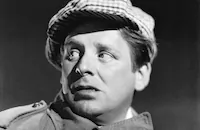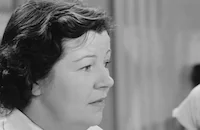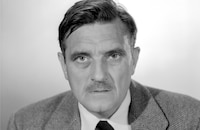The Cross of Lorraine

Brief Synopsis
Cast & Crew
Tay Garnett
Jean Pierre Aumont
Gene Kelly
Sir Cedric Hardwicke
Richard Whorf
Joseph Calleia
Film Details
Technical Specs

Synopsis
After the French government capitulates to the invading Nazis, French soldiers are ordered by their commanders to lay down their arms and turn themselves over to the German army. Among the captured men are Paul Duprey, a pragmatic lawyer; Victor Labiche, a fiercely patriotic taxi driver; wine merchant Andre Duval, who is openly sympathetic to the German cause; surgeon François Le Mair; Antonio Rodriguez, a Chilean; barber Jacques Boutroux; farmer Pierre Flandeau; and young René Marchand. Although the men have been assured that the Germans will be releasing them in France, they soon discover that they have been made prisoners of war. At their German camp, officers question the soldiers and quickly designate Duval, who speaks German, as their interpreter. Duval's willingness to help the Germans angers his fellow prisoners, Victor in particular. Later, the sadistic Sergeant Berger tosses a single loaf of bread into the men's barracks, and the starving prisoners dive for it. Although Victor finally claims the bread, he agrees to share it after Paul and Father Sebastian, an imprisoned priest, point out that the Germans want them to fight among themselves. Weeks later, Duval confesses to Paul that he, Berger and German corporal Daxer, who disguises himself in bandages, sometimes sneak illegally across the French border to buy French luxury items for Lieutenant Schmidt. Duval then asks Paul, who also speaks German, to join him, but Paul refuses. One night, the camp lights suddenly go out and the guard tower appears deserted. Suspecting a trap, the men are reluctant to flee, but Pierre volunteers to venture out and, as he is climbing the outer fence, is shot down by the Germans. Over Duval's objections, Father Sebastian says a burial service for Pierre in the camp yard and is shot and killed for violating prison rules, which forbid any religious expression. The next day, Major Bruhl, the camp's commander, orders Victor into his office and suggests that he use his leadership skills to help control his fellow Frenchmen. Victor spurns Bruhl and is sent to solitary confinement. There, a still defiant Victor spits on Berger, who in turn kicks him in the head, leaving a gash. The prisoners then threaten to hang Duval, and in his terror, Duval runs outside. After Rodriguez activates the camp alarm, Duval is shot by the Germans. Realizing that Duval was set up, Bruhl punishes all of the prisoners by ordering that every fourth man in the roll call line be singled out for execution. Ten prisoners are executed, and Paul is made the new interpreter. Although happy to be better fed and clothed, Paul is shocked when he sees Victor, his head wound festering, still in solitary confinement. Fearing that Victor will soon die from infection, Paul insists that he be taken to the infirmary, then tells attending physician Le Mair that he is devising an escape plan. After Bruhl reveals that he is allowing 150 Alsatian prisoners to return home as part of a recruitment scheme for Germany's labor battalions, he assigns Paul the task of tagging the selected men. Paul tags Rodriguez, Jacques, René and Victor, who is still recuperating from his infection, and then convinces Berger that he and Daxer should take him across the border to shop during the next day's roll call. When Victor, whose torturous experience in solitary confinement has drained him of his fight, refuses to go, however, Paul knocks him out, covers him with Daxer's bandages and slips him into the back of an ambulance. He then renders Daxer unconscious with chloroform and leaves the camp with an unsuspecting Berger, just after the other men take off for Alsace. As planned, René, Rodriguez and Jacques escape from their truck into the French countryside, while Paul drives Victor over the border. German security guards soon discover Paul's scheme, however, and pursue the ambulance. Paul throws Berger out of the racing vehicle and, after the ambulance crashes, kills the guards with Berger's gun. He and Victor are then helped by Louis, a young Resistance fighter, who leads them to Cadignan, where René, Rodriguez and Jacques have taken refuge with René's mother. Soon after the Frenchmen are reunited, German troops arrive in the village, searching for men to work in their labor camps. Paul incites the villagers to resist the Germans and is shot. Seeing his wounded friend's courage, Victor suddenly regains his own fighting spirit, and grabs a German's gun and begins firing. René, Rodriguez and Jacques join him, and soon all of the villagers begin attacking the surprised Germans. Although Rodriguez is killed, the Germans are eventually vanquished. The villagers then burn their homes and march away, while Victor, Paul, René, Louis and Jacques head off to join the Resistance.

Director

Tay Garnett
Cast

Jean Pierre Aumont

Gene Kelly

Sir Cedric Hardwicke

Richard Whorf

Joseph Calleia

Peter Lorre

Hume Cronyn
Billy Roy
Tonio Selwart
Jack Lambert

Wallace Ford

Donald Curtis
Jack Edwards Jr.
Richard Ryen
Frederick Gierman
Paul Marion
Fred Nurney
Louis Arco
Frederick Brunn
Otto Reichow

Hans Von Twardowski
Jay Black
Rhea Mitchell
Hans Hopf
Earle S. Dewey
John Merton
Dick Curtis
Walter Bonn
Sid D'albrook
Billy Engle

Margaret Bert
Dorothy Phillips
Leona Duray
Carmen Beretta
Simon Surgess
Barbara Bedford

John Abbott
Peter Helmers
Emma Dunn
Lionel Royce

Morris Ankrum
Felix Basch
Sven-hugo Borg
Ferdinand Schumann-heink
Bob Gilbert

Robert Stevenson
William Yetter
Fred Easler
Philip Van Zandt
Hans Furberg
Arno Frey

Harro Meller
Paul Rubenstein
Eva Rubenstein
Sandra Henley
William Vaughn
George Beban Jr.
Warren Burr
George Calliga
Tony Carson
Max Cutler
Danny Daniels
Paul Delmar
Gene Delmont
Dan Druff
John B. Dunn
Dale Easton
Dick Ellis
Charles Faber
Ben Gerien
Ray Hilton
William W. Hudson Jr.

Paul Langton
Egon Lind

Roger Moore
Stuart Nedd
Alfred Paix
John Phipps
Frederick Pressel
Philip Sudano
Robert Thompson
Fred Beckner
Louis Traves
Harry Wilson
Edward Kilroy
Henry Allen
Crew
Robert Aisner
Mac Alper
Robert D. Andrews
Daniel B. Cathcart
Lilo Damert
Jack Dawn
Alexander Esway
Karl Freund
Cedric Gibbons
Michael Kanin
Bronislau Kaper
Edwin Knopf
Ring Lardner Jr.
Warren Newcombe
Douglas Shearer
Nathaniel Shilkret
Julian Silberstein
Gile Steele
Sidney Wagner
Edwin B. Willis

Film Details
Technical Specs

Articles
The Cross of Lorraine
The film is based on the novel A Thousand Shall Fall by German refugee Hans Habe. A former French Foreign Legion member, Habe reportedly based the story on his experiences during World War I. MGM was asked to make the film as the War Office hoped to promote better regard among the Allies for the French. It was the studio's New York sales office that changed the film's working title from that of the novel to The Cross of Lorraine. It was a ripped-from-the-headlines title the Cross of Lorraine (originally a symbol of Joan of Arc) had very recently been added to the French flag by Charles de Gaulle and adopted as the symbol of the Free French.
The Cross of Lorraine was only Gene Kelly's fifth film and his third in a row (following the star-studded Thousands Cheer and the Pacific theater Pilot No. 5 [both 1943]) with a wartime setting. It was also one of Kelly's better non-musical, dramatic roles. Of his performance, Kelly remarked, "I thought I did quite well in the first half. But missed towards the end. I had several close-ups which just weren't registering what I wanted them to." Nonetheless, Kelly gave the experience of making the film high marks, commenting, "it was fun doing the picture. I didn't have to wear any make-up, nor did I bother about shaving. And it was a great pleasure to be able to get dirty without having the wardrobe department jump down your throat."
Tay Garnett remembered the production fondly as well, especially a couple of humorous on set moments. In his autobiography, Light Your Torches and Pull Up Your Tights, Garnett recalls the day that then Senator Harry Truman came to the set, escorted by the normally imposing MGM head Louis B. Mayer. "It was a delight," admitted Garnett, "to behold the Republican magenta of Louis B. Mayer's face as he personally provided top-drawer courtesies for the dapper little Democrat."
Another Garnett story had him and Cedric Hardwicke on their way to the commissary for lunch. Hardwicke was still in full priest attire. They came across Tommy Dorsey and his band rehearsing for Girl Crazy (1943) and stopped to listen. After a few minutes, Hardwicke turned abruptly to leave, as they only had an hour lunch break and plowed right into Greer Garson who was hurrying by. Garson apparently thought she had nearly taken out a real priest and offered up an "I'm so sorry father." According to Garnett, Hardwicke reacted "deadpan [and] blessed Miss Garson with the sign of the cross, then...executed a slow sensuous grind ending in a violent bump. In his priest costume, it was outrageous." Garson's reaction was momentary horror until she recognized Hardwicke. The incident remained a running joke between the actors; Hardwicke always greeted Garson with "bless you my daughter."
A couple of other interesting notes about The Cross of Lorraine: First, according to The Hollywood Reporter Charles de Gaulle supposedly wrote a letter to Jean-Pierre Aumont praising the film. Garnett, however, apparently never received the praise. "There's a rumor that the film was awarded a citation by General de Gaulle," said Garnett. "But if memory serves, I've never been kissed by a French general." The Hollywood Reporter also noted that preview audiences found the film too violent and that several viewers walked out of a screening. Critics, likewise, cited the film's graphic depictions. Variety, for example, called it, "gruesome," and said the film "provide[d] a vivid display of barbaric tortures."
But one such scene, where Hume Cronyn's turncoat character is shot by the guards, may be memorable for another reason - the scene was duplicated almost frame for frame in Stalag 17 (1953).
Producer: Edwin H. Knopf
Director: Tay Garnett
Screenplay: Robert Hardy Andrews, Alexander Esway, Michael Kanin, Ring Lardner, Jr., Robert Aisner (story), Lilo Dammert (story), Hans Habe (novel)
Cinematography: Sidney Wagner
Film Editing: Dan Milner
Art Direction: Daniel B. Cathcart, Cedric Gibbons
Music: Bronislau Kaper, Eric Zeisl
Cast: Jean-Pierre Aumont (Paul Dupre), Gene Kelly (Victor La Biche), Cedric Hardwicke (Father Sebastian), Richard Whorf (Francois Le Mer), Joseph Calleia (Antonio Rodriguez), Peter Lorre (Sgt. Berger).
BW-90m. Closed captioning.
by Stephanie Thames

The Cross of Lorraine
Quotes
Trivia
Notes
The working title of this film was A Thousand Shall Fall. The onscreen story credit reads: "Based upon a story by Lilo Dament and Robert Aisner and 'A Thousand Shall Fall' by Hans Habe." According to reviews and news items, Habe was a German refugee and former member of French Foreign Legion, whose book A Thousand Shall Fall was based on his own experiences during World War I. The film opens with footage and offscreen narration that introduces the main characters and gives a brief history of Germany's takeover of France. According to Hollywood Reporter news items, Philip Dorn tested for a part in the film, but was not cast, and Darryl Hickman was cast in the role of "Louis," but was replaced by Billy Roy. Hollywood Reporter news items add Eric Feldary, Joseph Granby, Henry Victor, Hans Furberg, Hans Von Morhart, Ted Wray and Henry Roquemore to the cast, but their participation in the final film has not been confirmed.
Many reviewers commented on the film's graphic depiction of prison life. The Hollywood Reporter review noted that during a preview screening of the picture, "there were many walk-outs following such scenes as the one where blood gushes from Gene Kelly's forehead...or the much gorier slaughter of Peter Lorre." The reviewers also pointed out the topical significance of film's title, as General Charles de Gaulle had recently ordered that the Cross of Lorraine, an emblem identified with Joan of Arc, be added to the French flag. The film opens and closes with shots of the "Cross of Lorraine" flag. According to a December 1943 Hollywood Reporter news item, de Gaulle wrote a letter to French star Jean Pierre Aumont, praising the film.















